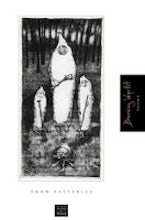'This is probably the best book to come out this year. Not only is this the most beautifully bound book of poetry I think I've ever seen, but Thom Satterlee is obviously a master at his craft' - Suite101.com. 'Thom Satterlee has fashioned a new genre, a contemporary hagiography in verse, primarily narrative but seasoned with lyric occasion. ""Burning Wyclif"" offers a deeply personal, word-savoring vision of a word-afflicted man, with the paradox and mystery one would expect of the life of a heretic and saint' - Scott Cairns, author of ""Compass of Affection: New & Selected Poems"". 'For its lyrical but authoritative evocations of a passionate scholars works and days, and for its formful penetrations into the Word itself the sound and sense/we made in that language/before languages. Thom Satterlees ""Burning Wyclif"" is a remarkable book, first or otherwise, inspired and earned' - William Heyen. 'These poems shine with the desire of a medieval priest. How strange. Yet the book illuminates his conundrums so fiercely that they become ours. Thom Satterlee speaks through the character of Wyclif with such concentrated intelligence, passion, and humor that while I was reading, the historical man seemed to be standing in the room beside me' - Jeanne Murray Walker. 'Most of us recognize the name John Wyclif and associate it with the translation of the Latin Vulgate Bible into English. Admirers will add that Wyclif was one of the most prominent philosophers and theologians of the second half of the fourteenth century. Others will call him heretic for his condemnation of what he saw as corruption in the Catholic Church and especially for his attack on the Churchs doctrine of transubstantiation. If we want to know the facts of Wyclifs life, we can consult an encyclopedia or biography. If we want to know John Wyclif, and maybe ourselves, we should read Thom Satterlees poetry collection ""Burning Wyclif""' - Robert A. Fink, from the Introduction ""Burning Wyclif"". Sometimes you have to raise the body up to burn it down. So it was with Wyclif, who rested forty-two years under chancel stone condemned by the Papacy, protected by the Crown. Finally, a bishop came with a few men, spades, shovels, a horse and cart. By then, not much was left of Wyclifhair and skin gone, his bones slipped out of place inside the simple alb they'd buried him in. The bishop gathered what he could. Beside the River Swift, he lit a pile of wood and tossed the bones on one at a time, cursing the heretic from limb to limb. Afterwards, they shoveled ash into the water and no one even thought the word martyr. Thom Satterlee is assistant professor of English at Taylor University in Upland, Indiana, and advisor for the universitys student literary magazine, Parnassus. His poetry has appeared in ""Alaska Quarterly Review"", ""Image"", ""Southwest Review"", and ""The Southern Review"" and has been selected for ""Poetry Daily"".
Habitus Awake in Oxford Tonsure Wyclif Places Himself, His Room Within the Ten Categories of Essential Being Wyclif Practices the Art of Definition While Walking to His Morning Class Wycliff Skips the Book on Heresy The Influence of Augustine Wintertime in Oxford The Steward's Prayer Book William of Ockham Visits the Sick Gravedigger Brethren of the Cross: Oxford, May 19, 1349 Ordination Last Rites A Young Italian Man Healed of the Plague by Saint Bridget of Sweden Ibn Khatir Tells of How He Survived the Black Death Wyclif's Heart Goes Out to a Widow Question 1: Whether Optics Explains Sufficiently the Phenomenon of Human Love? Question 2: Whether Fondness for Her Hair Should Warn a Priest Who Has Vowed Chastity and Meant It? Question 3: Whether Going to Her Door Was Not a Most Stupid, Regrettable Act? Question 4: Whether, Once Wounded by Love, One Ever Heals Completely? How Wyclif Survived the Long, Hard Winter of 1363: A Diptych Wyclif Becomes an Instrument of the Spirit On Angels On Celibacy On the Virgin Birth On Inspiration On the Eucharist On the Eve of Wyclif's Heresy Trial, the Duke of Lancaster Composes a Double Dactyl Against His Friend's Chief Enemy The Sense in Which Wyclif Might Be Called a Martyr Purvey Translates: In ipso enim vivimus et movemur et sumus One John Dies, the Other Wakes to Crickets The Black Friars Beg Wyclif to Recant of His Chief Heresy and Die in Peace: A Triptych Purvey Describes His Work with Wyclif Burning Wyclif A Visit to Lutterworth The Caretaker of St. Mary's Church Comments on Recent Scholarly Findings Snowbound in Wickliffe, Ohio

